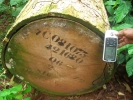 A recent report released by Global Witness, Blood Timber, shows how European timber industry helped to fund war in the Central African Republic. Seleka is a alliance of rebel militia factions that formed in September 2012. In March 2013, Seleka staged a bloody coup and seized power in the Central African Republic. Michel Djotodia was installed as president. By November 2013, the Guardian was reporting “unspeakable horrors” and “a massacre of the innocents” in the Central African Republic (CAR), while the world looked away. French Foreign Minister Laurent Fabius described the country as “on the verge of genocide”.
A recent report released by Global Witness, Blood Timber, shows how European timber industry helped to fund war in the Central African Republic. Seleka is a alliance of rebel militia factions that formed in September 2012. In March 2013, Seleka staged a bloody coup and seized power in the Central African Republic. Michel Djotodia was installed as president. By November 2013, the Guardian was reporting “unspeakable horrors” and “a massacre of the innocents” in the Central African Republic (CAR), while the world looked away. French Foreign Minister Laurent Fabius described the country as “on the verge of genocide”.
Seleka was ousted in 2014 and a transitional government is currently in place. But the crisis hasn’t gone away. Earlier this year, the UN Refugee Agency wrote that, “the CAR crisis is quickly becoming the largest forgotten humanitarian crisis of our time”. Two years on from the Seleka coup, 2.7 million people in CAR are in need of humanitarian aid.
In 2013, Seleka rebels were sent to the country’s rainforests, where they struck deals with logging companies from France, Lebanon and China. A new report by Global Witness documents how the logging industry helped bankroll the atrocities carried out against the people of CAR.
European companies are trading with CAR logging companies, which in 2013 alone paid over 3.4 million euros to rebels so that they could continue logging illegally, at scale and for significant profit. Europe is the premier destination for CAR wood, meaning EU member states are failing in their legal obligations to keep illicit timber off European markets. Europe is the premier destination for CAR wood, meaning EU member states are failing in their legal obligations to keep illicit timber off European markets.
European companies are trading with CAR logging companies, which in 2013 alone paid over 3.4 million euros to rebels so that they could continue logging illegally, at scale and for significant profit. Europe is the premier destination for CAR wood, meaning EU member states are failing in their legal obligations to keep illicit timber off European markets. Europe is the premier destination for CAR wood, meaning EU member states are failing in their legal obligations to keep illicit timber off European markets.


